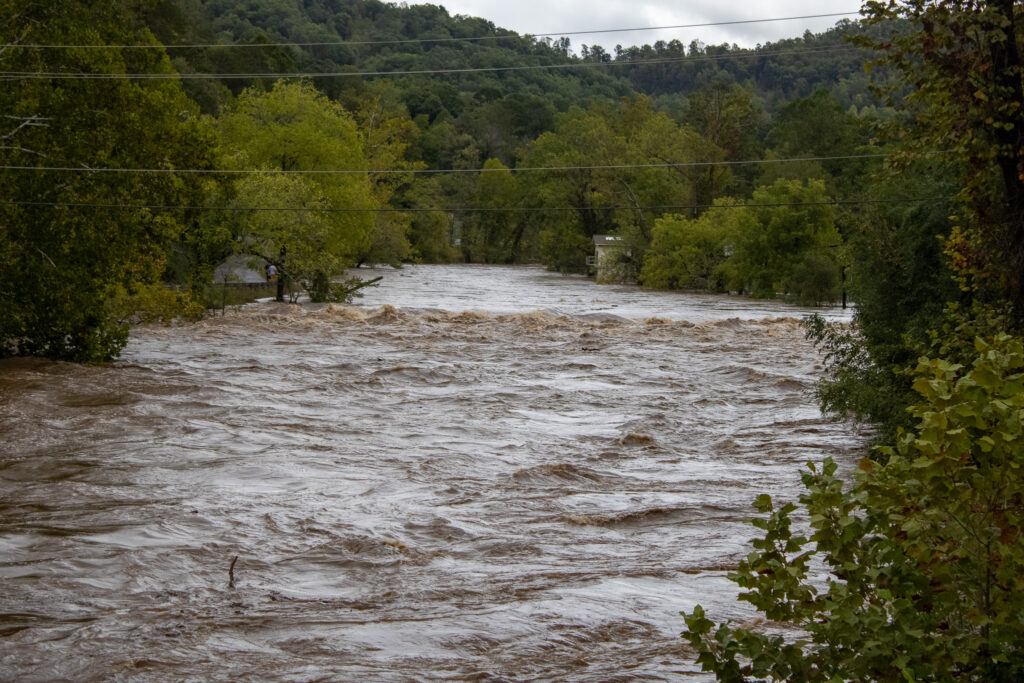Hurricane Helene has made an unprecedented impact on people in western North Carolina. People of Western Carolina University are living through unforeseen living conditions as normality slowly arrives back for students and staff.

On Thursday, Sept. 26, Hurricane Helene hit western North Carolina.
Hurricane Helene was placed as a Category 4 storm as it hit Florida, creating winds of more than 100mph. It moved through parts of Georgia and South Carolina before creating significant damage to western North Carolina.
At least 179 people have died across Southeastern states, including over 90 in flood-stricken North Carolina. Only the roofs of buildings can be seen in areas of western North Carolina as a result of the devastating flooding.
The campus at WCU experienced flooding in areas along the creek. The creek parking lot, baseball field and recreational fields were closed as a result of the overflowing of the creek. These areas of campus have since recovered from the flooding. Check WCJ story on campus recovery.
For students, the impact the disaster made was profound. The impact includes the loss of cell service and internet connection across the campus and surrounding areas.
Cadyn Cook, student at WCU, was greatly impacted by Hurricane Helene.
“I think the hardest thing is not being able to contact anybody,” Cook said. “Some people I still haven’t be able to talk to because they don’t have service, and I don’t have service.”
Campus Wi-Fi was rebooted Saturday afternoon, but students and staff who live off campus have been unable to connect to Wi-Fi in their own homes since.
The lack of phone service has made a significant impact on Cook and many other students at WCU as he is not able to contact his parents who have been evacuated from their homes.
“Everybody where I live (in Black Mountain) had to be evacuated and some people are stuck like my grandparents,” Cook said. “I heard that from my other family because I can’t contact my family who were evacuated.”
The flooding has caused over 50 deaths in Buncombe County. To see live updates on the situations in Buncombe County, click here.
Most of Cook’s family are safe since being evacuated, but this has still taken a toll on his mental health.
“Right now, I am not focused about school. I am more focused on my home and if it’s ok and my family,” said Cook.
Western Carolina University was placed into Condition Level 3 operations on Saturday, Sept. 28. This includes the cancellation of classes and the closure of all non-mandatory offices.
The school stated in an email that the cancellation of classes was due to the significant adverse impacts that surrounding communities are experiencing.
Madi Sawyer, student at WCU, says she has been living significantly different from her normal day-to-day life since Hurricane Helene hit.
“With no classes, my days have been looking very different,” Sawyer said. “I have been staying at my house without any phone service, which has been tough not being able to contact people.”
Sawyer, who is from Mooresville, North Carolina, has not been able to travel home due to road closures.
“Not being able to go home to my family during this hurricane has been tough,” Sawyer said.
Significant impacts are also being felt by the staff at WCU. Candy Noltensmeyer, a professor in communications, was stuck at her home until the flooding of Tuckasegee River in her area near Whittier receded.
“We drove down the mountain to find the river had risen over the road by about 5 feet, the highest I had ever seen,” Noltensmeyer said.
Noltensmeyer is preparing for changes in the way she teaches and communicates with her students as the resumption of classes approach.
“Everyone’s calendars will need to be adjusted, we will need to be flexible with dates and one another,” Noltensmeyer said. “This is an ongoing event that has changed all our lives in differing ways.”
Hurricane Helene has and will continue to make a significant impact on WCU, as normality slowly returns for students and staff.
For areas such as Buncombe County which experienced the worst of the flooding, normality seems unlikely in the near future.



